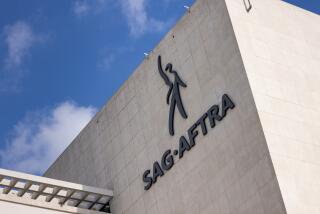Speaker Must Be a Voice, Not an Echo
- Share via
Rich Little is probably not going to like a recent decision by the U.S. 9th Circuit Court of Appeals. But many celebrities will appreciate the new legal protection against voice impersonation.
And for the rest of us, it should mean that when we hear a radio ad or see a television commercial with a celebrity endorsement, we won’t have to wonder who is really doing the talking. Sometimes, especially on the radio, it’s hard to tell whether it’s the real thing or someone impersonating a star. It’s easier when you hear someone who sounds like John Wayne or Groucho Marx--they couldn’t be hawking from heaven. We assume.
The precedent-setting decision last month came in a lawsuit filed by singer-actress Bette Midler against Ford Motor Co.
Midler was asked by Ford to sing one of her hit songs, “Do You Want to Dance,” for a series of 1985 Lincoln-Mercury commercials, but the Grammy award-winning singer, who does not do any commercials, refused. Instead, the company hired one of her backup singers, who was told to “sound as much as possible like the Bette Midler record,” according to the court.
Midler sued under several theories, all with some substance but not extensive legal precedent.
First, the court said, the impersonation of Midler’s voice did not constitute copyright infringement. Federal copyright only protects “original works of authorship fixed in any tangible medium of expression.” Breaking that down into English, a creative work has to be original and fixed, like in a book, a computer disc, a painting, or on a piece of paper; otherwise it’s not protected.
Let’s not get confused. A written song and a recording are copyrightable. But Ford did not infringe the copyright to the song in question, because it had obtained permission to perform it. (Midler didn’t own the copyright to the song.) But, as the court correctly noted, a voice is not copyrightable.
The court also decided that the law of “unfair competition” did not help Midler. Nancy Sinatra had once unsuccessfully sued Goodyear Tire and Rubber Co. because of a commercial with a look-alike singing “These Boots Are Made for Walkin’.” Sinatra tried to show that the song developed what lawyers call a “secondary meaning.” That’s a concept from trademark law, which means that whenever average consumers see a particular logo or product, they immediately assume the source of it is a particular company, the trademark owner.
So under this theory, Midler would have to show that whenever anyone heard the song, no matter who sang it, they’d think of her. And the court apparently didn’t think she could do that.
The court also said she couldn’t rely on a California statute that prohibits the unauthorized use of anyone’s name, photograph, voice or likeness. That law didn’t help Midler because it wasn’t her actual voice or name that was being used.
The trial judge had described Ford’s behavior as like that “of the average thief,” but didn’t think it violated any legal principle, and entered a summary judgment in Ford’s favor. But the appeals court wasn’t about to be so generous. By reversing the trial court’s decision, the suit will now proceed to trial. But what is important is the legal principle announced in the written opinion.
The court extended the doctrine of the common law tort of invasion of privacy, which protects against the unauthorized appropriation of a person’s name or likeness for commercial purposes.
“We hold only that when a distinctive voice of a professional singer is widely known and is deliberately imitated in order to sell a product, the sellers have appropriated what is not theirs,” the court explained.
The commercial in question did not have a disclaimer such as “celebrity voice imitated,” according to Midler’s attorney, Peter Laird. But such disclaimers are unlikely to be effective, under this court’s reasoning, Laird added, because the court viewed Midler’s voice as a property right that had been unlawfully taken. Under that reasoning, even Rich Little’s commercial impersonations, in which he openly identifies himself, could be questioned.
This case raises serious legal risks for those who make commercial use of anonymous sound-alikes. And an advertising technique that was becoming commonplace could soon be extinct, at least in the Western United States, where this case applies.
Attorney Jeffrey S. Klein cannot answer mail personally but will respond in this column to questions of general interest about the law. Do not telephone. Write to Jeffrey S. Klein, Legal VIEW, The Times, Times Mirror Square, Los Angeles 90053.
More to Read
The biggest entertainment stories
Get our big stories about Hollywood, film, television, music, arts, culture and more right in your inbox as soon as they publish.
You may occasionally receive promotional content from the Los Angeles Times.










